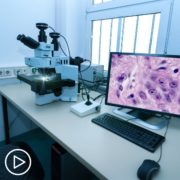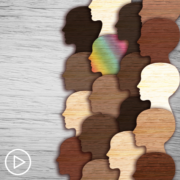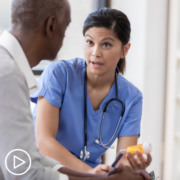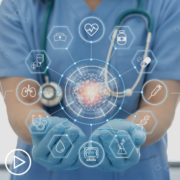DLBCL Treatment and Research Updates Patients Should Know About
DLBCL Treatment and Research Updates Patients Should Know About from Patient Empowerment Network on Vimeo.
What diffuse large B-cell lymphoma (DLBCL) treatment and research updates should patients know about? Expert Dr. Amitkumar provides an overview of recent updates and shares credible resources to learn about emerging research.
Dr. Amitkumar Mehta is Director of the Lymphoma Program and CAR T Program and Medical Director of the Clinical Trials Office at O’Neal Comprehensive Cancer Center at UAB. Learn more about Dr. Mehta.
Related Resources:
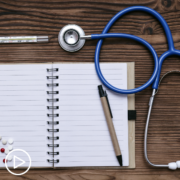
DLBCL Treatment Approaches for Newly Diagnosed and Relapsed/Refractory Patients |
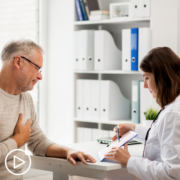
|
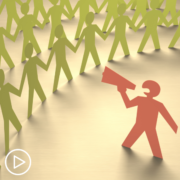
|
Transcript:
Katherine:
The annual American Society of Hematology, or ASH, meeting happened recently, where DLBCL experts shared their research. Are there updates that patients should know about?
Dr. Mehta:
Absolutely. There are so many promising agents that were presented in a wide variety of different clinical trials, early phase or Phase I, Phase II, and also some of the advanced studies that were discussed. The promising right now, I say in a relapse setting, potentially curative is the CAR T. There was some long-term data, a newer platform of CAR T therapy, autologous, that means where patient’s own T cells have modified. There are quite many products already approved. Their long-term data, safety, and efficacy was discussed – very impressive. The new set of cellular therapy, which includes not only CAR T but other immune cell like NK cell therapy, which are also presented – very impressive. Now, remember, we need to auto our own CAR-T cells being processed. There is a time lag, about two or three weeks for preparing those cells compared to the others they’re over the shelf.
Of course, all of this data are early, but they are very promising going forward. The others are bispecific antibodies. So, so far what we have is the monoclonal antibodies targeting single antigen like CD20 or CD19. But now we have bispecific, which targets CD20 on one end but CD3, the T-cell antigen on the other end. And those antibodies have proven very effective in all B-cell lymphoma and large-cell lymphoma.
And there are so many other agents in early phase. As we go out more in-depth going forward, we will lower their efficacy and side effects and how they fare compared to the other approved agents. So, very exciting time for lymphoma patients. So, that even if it comes back, we have multiple options to have it back in remission and potentially a cure going forward.
Katherine:
Yeah. No, that’s great. How can patients learn more about emerging research?
Dr. Mehta:
Very important question. And currently, as we were discussing, Googling sometimes is not the right way because it is unfiltered information. And its sample size could be different. Somebody has a negative experience, and they would write that, and the person reading might have a different perception of the diagnosis and treatment. There are good websites, American Society of Hematology, American Society of Clinical Oncology, Lymphoma & Leukemia Society.
There are many other cancer societies. They have good information available. But the most important is actually the responsibility, in my opinion, lies on the provider. When the patient comes and sees me, I make sure that I share the information with the patient. And I direct them to the right source of information, and it should be interactive.
That means if they read something if they have any questions, they come back and ask me. At the end, it is our responsibility as a care team to be available, first of all, for any questions and provide right information. What I’ve learned through a period of time that that has helped patient quite a bit all across so that they don’t have to wander around for nonspecific information like on Google or other search platforms

